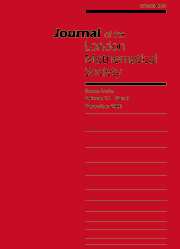Article contents
HIGHER ORDER ABSTRACT CAUCHY PROBLEMS: THEIR EXISTENCE AND UNIQUENESS FAMILIES
Published online by Cambridge University Press: 25 March 2003
Abstract
Let $X,Y$ be Banach spaces. Of concern are the higher order abstract Cauchy problem $({\rm ACP}_n)$ in $X$ and its inhomogeneous version $({\rm IACP}_n)$. A new operator family of bounded linear operators from $Y$ to $X$ is introduced, called an existence family for $({\rm ACP}_n)$, so that the existence and continuous dependence on initial data of the solutions of $({\rm ACP}_n)$ and $({\rm IACP}_n)$ can be studied, and some basic results in a quite general setting can be obtained. A sufficient and necessary condition ensuring that $({\rm ACP}_n)$ possesses an exponentially bounded existence family, in terms of Laplace transforms, is presented. As a partner of the existence family, for $({\rm ACP}_n)$, a uniqueness family of bounded linear operators on $X$ is defined to guarantee the uniqueness of solutions. These two operator families for $({\rm ACP}_n)$ are generalizations of the classical strongly continuous semigroups and sine operator functions, the $C$-regularized semigroups and sine operator functions, the existence and uniqueness families for $(ACP_1)$, and the $C$-propagation families for $({\rm ACP}_n)$. They have a special function in treating those ill-posed $({\rm ACP}_n)$ and $({\rm IACP}_n)$ whose coefficient operators lack commutativity.
Information
- Type
- Notes and Papers
- Information
- Copyright
- The London Mathematical Society, 2003
- 13
- Cited by

